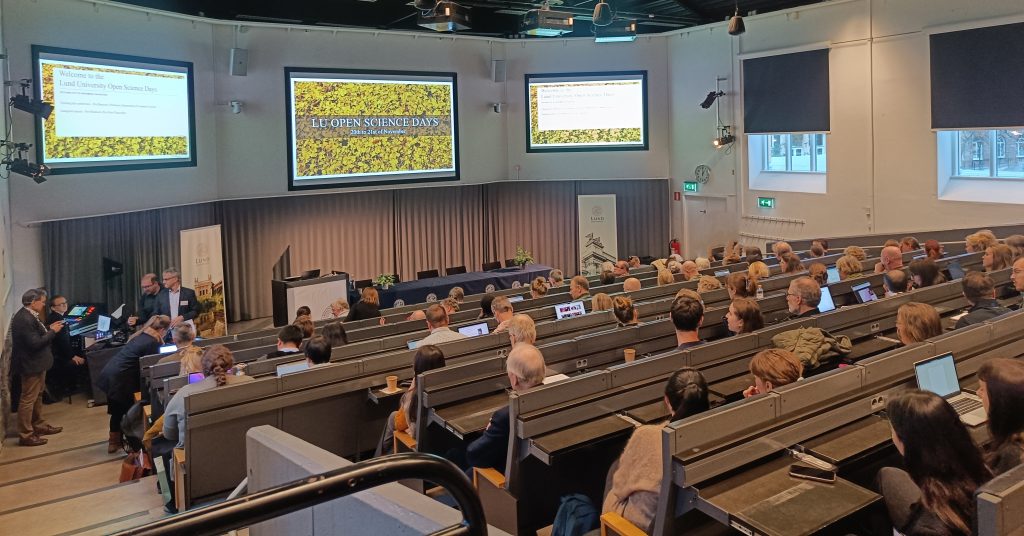This week it was finally time for the first LU Open Science Days ever. With 150 registered participants and a diverse set of speakers from LU as well as external keynotes, the committee was eager for the event to start.
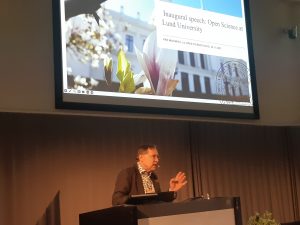 In his inaugural speech pro-vice chancellor, Per Mickwitz encouraged participants and the audience to share their open science practices. The diversity of ways of engaging with open science permeated the event, and several speakers highlighted that open science entails a cultural change in academia. Per Mickwitz accounted for the role of open science in LU’s research strategy and the new open science organisation that was established this year and underlined the importance of open science by saying that “open science increases trust in research, leads to better research and greater impact”.
In his inaugural speech pro-vice chancellor, Per Mickwitz encouraged participants and the audience to share their open science practices. The diversity of ways of engaging with open science permeated the event, and several speakers highlighted that open science entails a cultural change in academia. Per Mickwitz accounted for the role of open science in LU’s research strategy and the new open science organisation that was established this year and underlined the importance of open science by saying that “open science increases trust in research, leads to better research and greater impact”.
The following session addressed educational and skill enhancing efforts for students and staff in the area of open science. Åse Innes-Ker shared her experiences of incorporating processes for openly documenting data and methods for analysis in her teaching of master’s students in psychology. Maggie Hellström from the ICOS Carbon Portal talked about a PhD course about research data management given at the Faculty of Science. The session’s third speaker, Maria Johnson from the Library and ICT-services at the Faculty of Medicine talked about the role of the library in skill enhancement and the courses and support offered to PhD-students and researchers at the Faculty of Medicine. In all three initiatives, younger and early career researchers were the target group for the initiatives and a question from the audience to the speakers concerned how to get through to more senior researchers that might not be too keen on changing their practices. The answer addressed the importance of identifying the right channels for reaching this group and engage in dialog, and to focus on the researchers’ own experiences and struggles related to research data management.
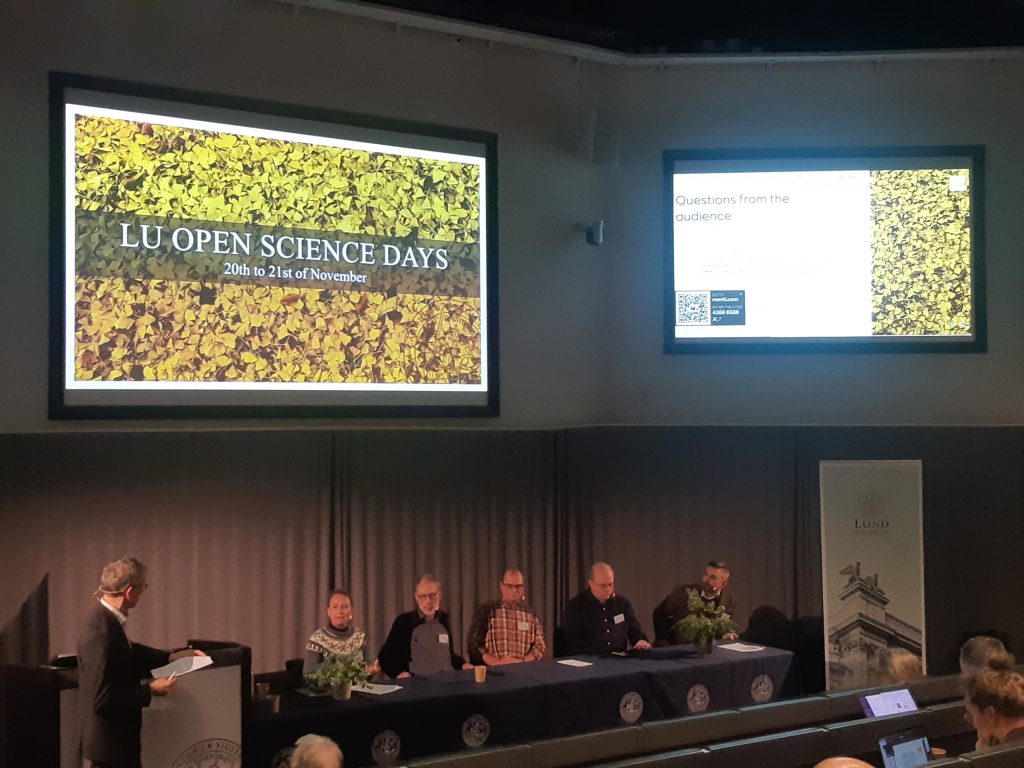
The following session on research data management started with a keynote. Anders Conrad from DeiC talked about the implementation of the FAIR principles and drew on developments and experiences from Denmark and Europe. In his talk, Anders illustrated how the notion of data management, the FAIR principles and open science relates to different activities surrounding research. The keynote was followed by four shorter presentations from researchers at LU sharing their experiences of research data management and working with the FAIR principles. Anna Lundberg described her and her colleagues work with establishing the Asylum archive that gathers material from interviews carried out during the period 2015-2017 with refugees seeking asylum, activists and staff from authorities. The importance of maintaining the archive is unquestionable since those accounts can never be gathered anew. At the same time, making this kind of data available is also a challenge. The Digital Archaeology Lab at LU has lots of experience of digitizing excavations and artefacts in 3D and making their collections available. Nicoló Dell’Unto concluded in his speech that “open science is not about technological improvement but a paradigm shift that requires a transformation in every segment of the knowledge production process”. Harry Lankreijer from the ICOS carbon portal shared the experiences from this pan-European Environmental Research infrastructure that gather data about carbon emissions. The session’s final speaker Jonas Lindemann from presented the resources for high-performances computing, visualization, and storage that LUNARC offer their users. The following discussion led by Per Runeson addressed amongst many things potential risks of sharing data. Nicolo Dell’Unto pointed out that control over data implies control over both past and future. Early archaeology sorted data in ways that have misrepresented history and the importance of learning from such experiences is crucial today. To manage large quantities of data is a big responsibility. Anna Lundberg agreed her data could potentially fuel populist movements but emphasised that the value of sharing and making the data – and by extension the stories relating to asylum processes – weighs heavier than the risks. For the collaborators at ICOS sharing was part of the set-up and general idea already when the infrastructure was established.
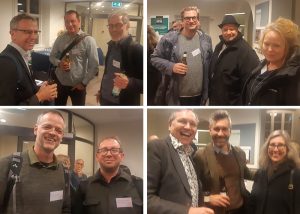
The first day ended with a mingle and exhibition outside the auditorium. Posters included examples of implementation of the FAIR principles and support offered by the libraries at the university. Vattenhallen Science Centre had brought a robot that occasionally accurately identified the mood of participants if they let the robot take their picture. Lund University Press the Humanities and Theology faculties’ book series displayed printed versions of their publications, which are also available open access.
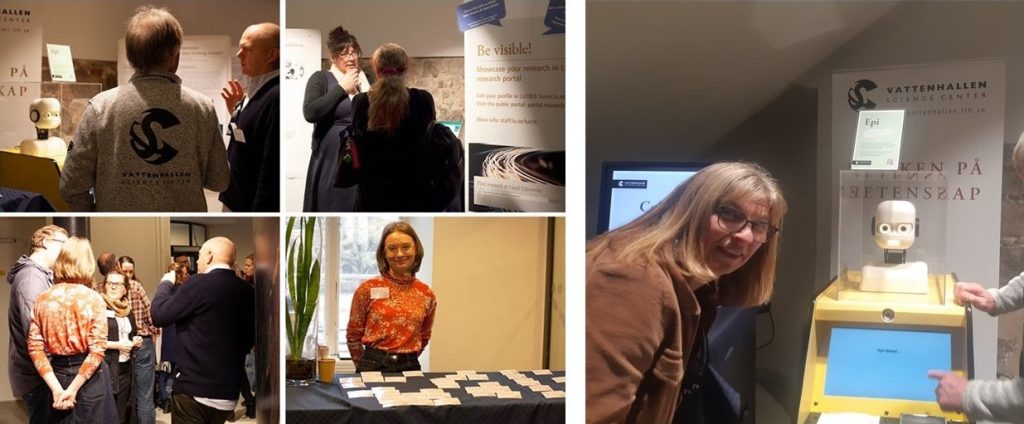
The themes on the second day were open access publishing and outreach. Björn Brembs, the second invited keynote speaker was first to take the floor. In his talk titled Replacing Academic Journals (same as an article he has written with co-authors and that is available here) he suggested research institutions to take control of publishing infrastructures and that these replace the current corporate owned journal system. The following session continued the publishing theme with attention to financing of open access journals.
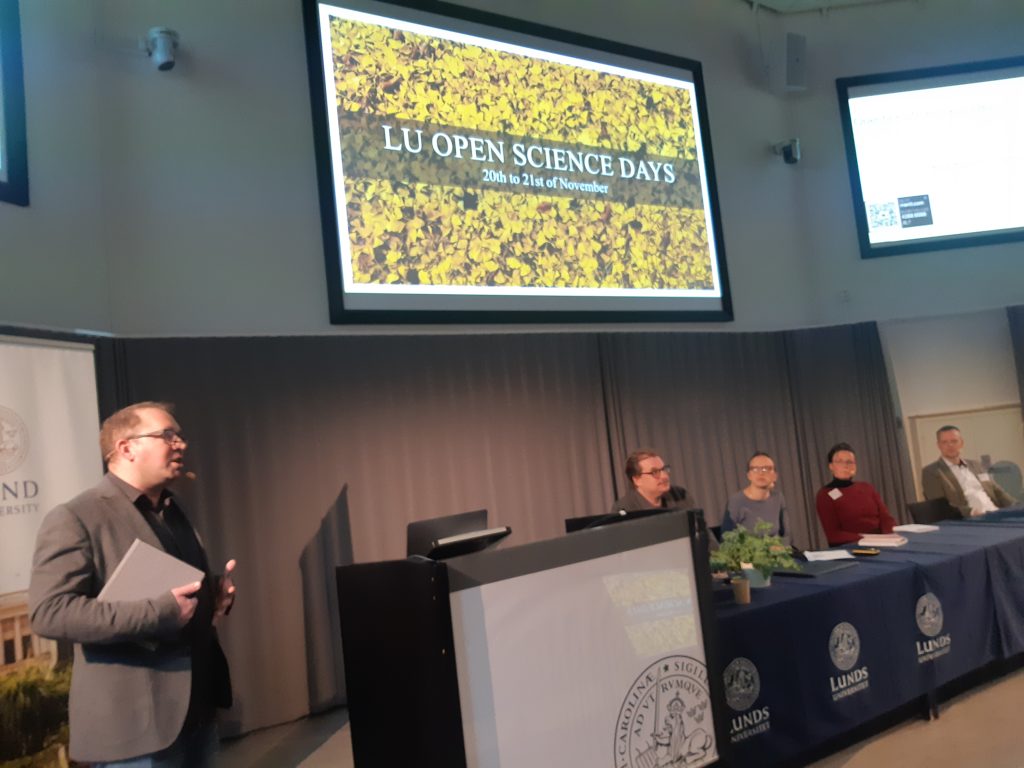
The moderator Nicholas Loubere and speakers Ekaterina Chertkovskaya and Annegret Engel, all editors of diamond open access journals (Made in China Journal, Ephemera and the Nordic Journal of European Law), gave their experiences and views on the current situation for their respective journals. Ekaterina Chertkovskaya summarised the mayor challenge to be “how to channel funding to not-for-profit journals and other publishing initiatives and away from for-profit publishers”. Annegret Engel raised the question of what the Nordic Journal of European Law should do if they do not manage to secure funds, should they continue and depend on even more voluntary work or turn to a professional publisher and sell their product? Reoccurring themes were that that being an editor is a “labour of love and care” and that finding sustainable funding for running a diamond open access journal is a constant challenge. While independent journals struggle to survive, enormous amounts of money goes to commercial publishers through transformative agreements. Kristoffer Holmqvist, head of the department of scholarly communication at the University Library was also one of the speakers in the session. Even though his department manage all the deals the university has with publishers via the national consortia BIBSAM, and he and his colleagues agree there are plenty of problems with these deals, the library is neither responsible nor have the mandate to change the system, even though they would like it to change. Kristoffer Holmqvist said that in order to stop the university from spending money on expensive publishing deals we need to discuss incentives, rewards, publishing strategies, infrastructure, and alternative publishing outlets.
The following session took a deep dive into outreach as an open science practice. In her introductory presentation, Monica Almqvist, office director at Vattenhallen Science Centre, talked about how the cultural and public centres at Lund University play a pivotal role in raising young people’s interest in science. Vattenhallen collaborate with schools, for example the science fair Unga forskare and with the Swedish National Agency for Education in creating programming workshops for teachers. Monica Almqvist emphasised the importance of outreach for the future of the scientific community, citing research that indicate that children with a high science capital are more likely to pursue a carrier in the STEM-fields.
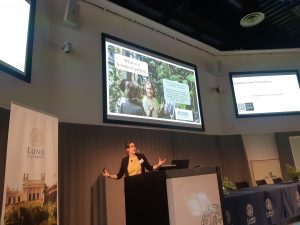
Allison Perrigo, director at the Lund University Botanical Garden, shared her own experiences of having her scientific curiosity awakened by science centres. Apart from being a highly appreciated park, the Botanical Garden is an important research infrastructure, practicing research and conservation while at the same time managing exhibitions, educational tours and school collaborations. Holding a unique collection of threatened species, Allison Perrigo described how their outreach activities covered cross-disciplinary subjects like the colonial history of plant conservation. In a following panel discussion Ulf Ellervik, professor at the Centre for Analysis and Synthesis, cited media participation as an outreach activity and accounted of his experiences writing popular science books and participating in popular media. All three speakers encouraged researchers to engage in outreach but acknowledged the struggles in simplifying while at the same time being correct and nuanced. Ulf Ellervik pointed out the cultural differences between popular media and academia. In popular media, all researchers are experts in their discipline even if they work in an environment where everyone is highly specialized. He further stressed that outreach is even more important now as the information landscape is increasingly fragmented.
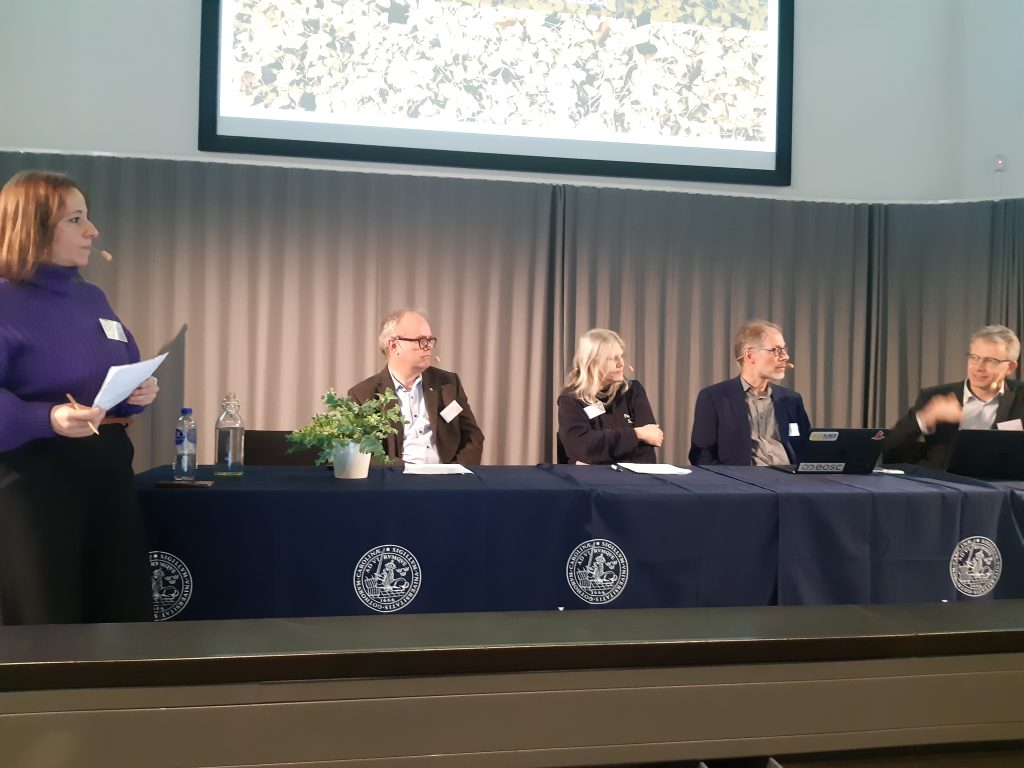
The concluding panel focused on the future of open science. Moderator Angeliki Adamaki, Department of INES and ICOS Carbon Portal, opened by explaining the mission of the LU Open Science Days to describe the scientific journey of a researcher. Starting with education in open science, research data management and how Lund University can equip scientist to practice open science, to how the results can be published and in turn how the results from open science practices can have an impact on society. Håkan Carlsson, Library director at the University Library, presented the library’s role and support in making a cultural shift towards open science a reality. Per Runeson highlighted the important work done by researchers, infrastructures, libraries, and other actors at LU to promote open science, while at the same time acknowledging the need to develop and facilitate support structures for researcher to practice open science. A culture change can take time and cannot be imposed top-down. Maggie Hellström brought up the importance of working together and breaking down the notion of them and us within academia. LU should prioritise coordination on how to teach open science to all staff and take a practical approach in setting up infrastructures like storage solutions. Anders Conrad mentioned the influence of AI and machine learning on open science and open access in the coming years. The panel was asked who has the responsibility for making science open, is it the individual researchers or the university? Per Runeson said he favours carrots before sticks and that it therefore is important to talk about incentives rather than responsibilities that sounds more like sticks. Håkan Carlsson echoed the statement by saying that making open science possible and easy is the university’s responsibility.
Concluding LU Open Science Days Nicholas Loubere emphasised that open science and open access require all parts of the university to work together. The presentations at the conference showed there are many things already going on. While a change is dependent on top-down initiatives, we all make up Lund University and we need to work together to foster a cultural shift towards making science open.
Thanks to all of you who attended LU Open Science Days!
